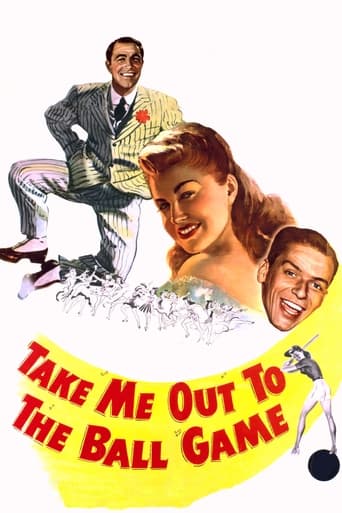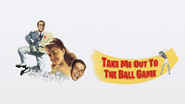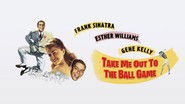Steve Pulaski
Take Me Out to the Ball Game is a spirited musical-comedy, resting its quality almost entirely on the weight of its performers, Gene Kelly and Frank Sinatra, as they play two baseball players who experience the shock of their careers when they find out the new owner of their baseball team is a woman (Esther Williams). At first, with her name announced as K.C. (Katherine Catherine) Higgins, the players, including Eddie O'Brien (Kelly) and Dennis Ryan (Sinatra), all assume by default that she's a man, but after a downright awkward mix-up at the train station when it comes time to pick her up, both Eddie and Dennis vent their frustrations about their new owner to one another.It would be a lot easier for them to stick to their simple frustrations if they both didn't find themselves rapidly falling in love with Katherine as soon as she became their new owner. Along with the difficult task of trying to get their team, the Wolves, to win another pennant, the boys must find a way to control themselves around Katherine, as well as work out some sort of cogent lines for respect when it comes to flirting and mingling with her.Punctuating this muddled relationship triangle are the film's most enthusiastic and accomplished features - its musical numbers. One of the first involves both Eddie and Dennis singing an infectious, harmonious ballad about past lovers called "Yes Indeed" with a ravishing song and dance number to accompany it. This is where the film finds its energy put to good use being that scenes that take place on the actual baseball field are slight and the relationship drama is overall petty and largely uninteresting. Having Kelly and Sinatra serve as vaudevillian performers in addition to rather narcissistic baseball players is a nice touch that works to lift the film out of whatever drudgery it would've succumbed to had it just been about the love triangle.With that, Williams holds her ground quite nicely in a film that's populated and controlled by men and their raging hormones and pride. Her character's snarky comments and incorruptible demeanor makes her a dominant force in the film that doesn't make her easily fazed by the multitude of sexually charged comments being spewed her way for much of the film. As a result, she becomes an admirable presence with a great deal of energy and charm to offset the frequently simple-minded behavior of Eddie and Dennis.Take Me Out to the Ball Game was the final film directed by Busby Berkeley, but was originally supposed to be directed by Gene Kelly and Stanley Donen. With Kelly's success as a performer, he was originally contracted by MGM to direct this film, but after the studio hired Berkeley to helm the project, Kelly and Donen were shifted to a screen writing credit by their producer Arthur Freed. As part of a compromise, Freed allowed Kelly to direct some of the musical scenes he did with Sinatra, despite leaving the bulk of the directorial duties to Berkeley. The result is a film that's charming through all its discombobulation, yet always watchable thanks to its gifted performers, especially Williams, who shouldn't be overshadowed by the performers with bigger names.Starring: Gene Kelly, Frank Sinatra, and Esther Williams. Directed by: Busby Berkeley.
weezeralfalfa
The second of 3 Kelly-Sinatra comedic musical romances, being released only months before their more highly acclaimed "On the Town". Kelly was coming off two swashbuckler roles in the previous year: the highly accaimed historical drama "The Three Musketeers", and the innovative, but poorly received, Minnelli musical "The Pirate".Sinatra had most recently starred in the much criticized musical "The Kissing Bandit"(which neither he nor Kathryn Grayson wanted to do).Thus, it was decided that Sinatra apparently needed to be reteamed with Kelly to make a blockbuster film. They hit a home run twice in one year, with different leading ladies for the aggressive Kelly, but the same man-hungry lady(Betty Garrett) immediately falling for the skinny shy Sinatra character. It was Kelly who conceived the idea of combining vaudeville with baseball. Thus, Kelly and Sinatra are an unlikely pair of vaudeville performers in the off-season, and key players on the hottest team in the American League. Even more unlikely, their new owner is a beautiful single classy woman(Esther Williams, as K.C. Higgins), who insists she knows more about how to play the game than the players. Naturally, there is a clash with the braggart Kelly: the offensive and defensive star of the team, leading to some comedic moments.I have not read it as fact, but I strongly suspect that the name Higgins is derived from M.J. Huggins, who managed the NY Yankees during the Babe Ruth years of the 1920s. Sinatra(as Ryan) and Kelly(as O'Brien) vie for the heart of Miss Higgins, Shy, seemingly a bit retarded, Ryan has the initial lead but, as always, the more experienced extrovert Kelly character ultimately triumphs. Ryan gets the man-hungry baseball enthusiast Shirley(Betty Garrett) as a consolation prize. Betty had established vaudevillian talents, which film writers Kelly and Stanley Donen apparently thought were deficient in Esther. Hence, the much discussed unhappiness of Esther during much of the making of this film. Obviously, Kelly and Donen would have much preferred Judy Garland, the original choice as Higgins, or some other established top female known as a singer or dancer. Esther was most famously billed as a stunt swimming beauty, but she showed she could sing and do the comedy and dancing bits well enough. I'm not sorry she got the part. The ego-sensitive Kelly was also put off by the fact that Esther was a bit taller than him, which he thought looked bad when they were standing close.The drama of the last portion of the film centers around O'Brien's decision to moonlight as a show performer shortly before the end of the baseball season, baited by bookies who have bet his team won't win the pennant. His performance on the field greatly suffers and he is fired for violating curfew. A hesitant offer to rejoin the team for the last game has dangerous consequences for O'Brien, which precipitates the resulting drama. The closing scene has Kelly and Sinatra back on a vaudeville stage, now accompanied by Esther and Betty, and instead of singing the title song again, they do a reprise of the patriotic song "Strictly USA". Although not quite the flag waver of "Yankee Doodle Dandy" and some of the other musicals made during WWII, this film has its pro-America moments.I found all 5 of the vaudevillian song and dance routines entertaining, including Kelly's famous solo "The Hat My Dear Old Father Wore Upon St. Patrick's Day", part of which reminded me of Cagney's classic "Yankee Doodle Dandy". Vaudevillain Jules Munshin, who played the third leg of the double play trio, added an additional comedic element and would find an expanded role in "On the Town". The long chorus-accompanied "Strictly USA", at the claim bake, was also good, and served as a build up to Kelly's solo dance. Of the musical numbers, only two are romantically centered, one("The Right Girl for Me") sung, ironically, by Sinatra to Esther, the other("It's Fate, Baby, It's Fate") sung primarily by Betty to Sinatra. They are both good songs, but we are missing romantic ballads sung by Kelly to or with Esther, and sung by Sinatra to Betty. These would have provided additional breaks from the drama-comedy scenes and helped cement these relationships. Actually, such were filmed, but cut: a big mistake to my mind! They can be seen as outtakes on the 2008 Warner DVD. My rating of the film would go up a notch to nearly the equal of "On the Town", if these has been included. Cut was the catchy Harry Warner-Johnny Mercer "Baby Doll", sung by Kelly, with some comedic gesturing by Esther and prancing by Kelly. Later, Astaire would sing it to Vera-Ellen, followed by their dance, in "The Belle of New York".In summary, I found this a top notch entertaining musical, nearly the equal of "On the Town", with multiple good vaudevillian song and dance routines and lots of comedy, but missing two of the best filmed songs. I only wish they didn't always make Sinatra seem so dopy and naive compared to Kelly(no doubt a Kelly-directed characterization). It gets better each time I view it:the mark of a true classic. Rating 9.5






